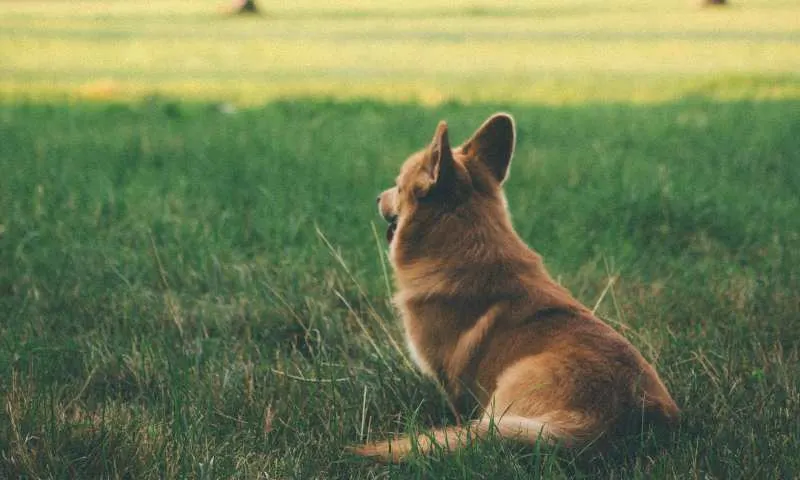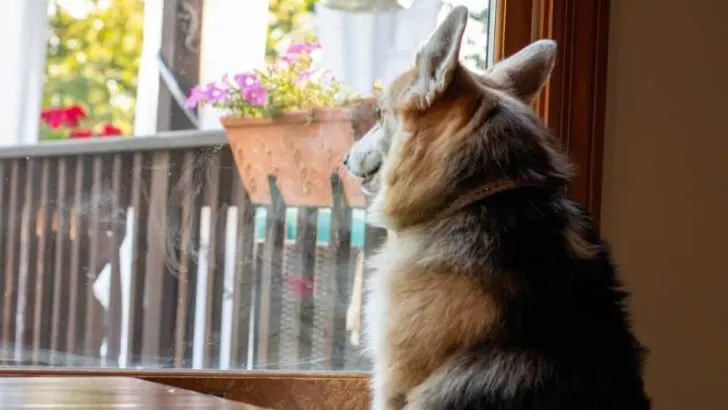Your Corgi is your best friend and a part of your family. It is thus only logical that you want to secure the best living conditions for your pooch. That is how you come to the question: Are Corgis inside or outside dogs?
If you keep reading, you will find out whether it is better to keep your Corgi inside or let him or her live and sleep outside. We will thoroughly discuss all the pros and cons of both options so that you can find the best solution for your pet.

Can Corgis Be Outside Dogs?
The answer is: Yes. Even though they should ideally be kept inside, Corgis are a breed that can live outside too – if properly aged, trained, and all the right conditions are secured.
If you have a young Corgi puppy, the answer is no. You have to wait while your dog becomes a bit older to move it outside, or you risk disturbing your pet’s mental health. Proper training during this period will also secure good behavior once your dog is moved out.
If your Corgi is untrained, he or she will most likely not feel safe outside. As a result, your pet won’t be able to stop barking or moving around. If your property is not fenced, your Corgi can even take off when he or she gets scared by something.
The most common issue people have with Corgis living outside is barking. Corgis generally have a problem with barking too often or too much (or both), no matter whether they live inside or outside. Corgis are lively and alert dogs – it is simply in their nature to bark at anyone who comes into their personal space. They are hard-wired as guard dogs.
When Corgis are outside, they have much more to bark at since they are surrounded by constant stimuli. That is why it would be best to close your pet inside during the night so that both you and your pooch can relax and have a good night’s sleep.
If you want to find out more about the problems that are likely to occur when you let your Corgi live outside, read the following section.
Read Also: How To Train A Corgi To Pee Outside?

Five Greatest Problems Corgi Owners Face When Their Dog Is Staying Outside
1. Problem With Neighbors
As we have already warned you, your Corgi living outside represents a serious noise hazard. The reason behind this is most often craving for attention.
Corgis are social dogs that require a lot of owner’s companionship. If they are left alone for too long, they become anxious & stressed and start attracting their owner’s attention either by incessant barking and whimpering or jumping, running, and digging.
Any of these behaviors will create noise – some more than others. As a result, your house and yard can become too loud for your neighborhood. Your neighbors are entitled to rest and have a good night’s sleep. If they are deprived of that due to your dog being too loud, they might become angry at you – and rightfully so!
You can help both them and your Corgi by taking the following steps:
- Do not respond when your dog barks – your playful Corgi might interpret your attention as a reward and start barking more often or louder.
- Start training your dog to respond to the “quiet” command as early as possible. Here is how to do it:
- Start by making your Corgi bark. You can take away their favorite toy to “inspire” your dog to bark at you and give him or her a treat when they do.
- Say “quiet” (you can make a hand gesture like lifting your finger as well). Your dog will most likely stop barking and look at you in confusion. Use the moment of silence to praise and reward your pet.
- Repeat both commands while your dog masters them. Then, give your dog treats for both being loud and staying quiet so that he or she will figure out staying quiet on purpose.
- Warn your neighbors that your dog is in training and plead for their understanding. Most people will understand your circumstances, realize that the noise is only temporary, and allow for some time for everything to sort out.
- Socialize your dog as early as possible by introducing him or her to a lot of new people. If your Corgi gets acquainted with all your friends, neighbors, and relatives, he or she will learn to trust them and thus stop barking at them as well. The more people play with your Corgi during his or her 1-year socialization period, the friendlier your dog will be towards strangers later in life.
2. Separation Anxiety
A lot of Corgis sleep during the day and become more active at nighttime. If they are left outside all night long, they can start feeling lonely and excluded from the family. This will reinforce their separation anxiety and make them turn to negative or even destructive behavior.
They can start from little things such as destroying your plants or scratching paint from your walls or fence. Unfortunately, things can escalate rather quickly, and your Corgi can stop obeying your commands completely, hoping that it will make you give in.
Your presence is reassuring for your Corgi, and you need to help your pup understand that leaving him or her is only temporary in order for both of you to function properly. If you are having trouble keeping your puppy happy at night, try the following:
- Consult a dog trainer or a behaviorist as soon as you notice your Corgi is anxious. Then, you can get a valid opinion if your dog should be left outside or not. These professionals will also teach you how to best resolve the separation anxiety issue.
- Tuck your Corgi in and say a quick goodbye. If you look back and appear hesitant, your dog might think you still want to play.
- Give your Corgi a new ‘nightly’ toy that he or she can snuggle with while you are not around. It can be a ball, a teddy bear, or even a chew toy – just make sure it does not produce any sound.
- Limit your Corgi’s movement by keeping him or her in a playpen or invest in a fence to keep your dog safely confined and unable to escape. Make sure your dog has a house to protect him or her from the elements and provide comfort.
- Leave a piece of your clothes or your towel with your Corgi. Your dog suffers from anxiety because he or she cannot sense you, and things that have your scent on them can help your pet overcome this issue.
- Make sure your Corgi is not full of energy when you leave him or her. If your Corgi has had enough playtime and exercise during the day, he or she will be exhausted and want to sleep. It would be best to play with your dog near the crate for at least half an hour before you both go to sleep.
- If your dog has made it through the night with little or no trouble, reward him or her as soon as you wake up.
3. Noise Anxiety
Even though dogs often find background noises such as TV or radio comforting, not all noise is good – quite the opposite. Some noises can irritate your Corgi and contribute to the anxiety issue.
When your Corgi is outside, he or she will likely hear a lot of sudden, loud sounds such as that made by a siren or thunder. It can cause noise anxiety in your pet.
Here is how to recognize when your dog is anxious about noise:
- Your dog hides as soon as he or she hears a particular sound.
- Your Corgi starts whining, panting, or drooling excessively.
- Your dog pees or poops as soon as he or she hears a disturbing sound.
- Your Corgi is walking listlessly or seems frozen in one place.
How Can You Help Your Dog?
- Stay calm, do not lose your temper, and yell, or you will become a part of the problem.
- Pet your Corgi to let him or her know you are there, and you care. Do not overdo it, though, or your dog can become too clingy.
- Ask your vet if some medications can help cushion your dog’s anxiety. Of course, it all depends on how severe your Corgi’s case is, but the vet might recommend some sleep-inducing or anxiety medications.
- Desensitize your Corgi to the noise that makes him or her anxious. Start by playing the sound your pup is afraid of and reward him or her when there is no reaction. Be patient – it can take longer, even months, for your dog to overcome phobias.
- Never punish your Corgi for being afraid! If you do that, you risk traumatizing your pet and hurting your relationship.
4. Hyperthermia
The double coat makes Corgis vulnerable to hyperthermia that can prove to be deadly for these poor dogs. Here are the signs of warning:
- Panting – your dog is panting when trying to let the heat out of its body. If your dog is still and panting on a hot day, he or she might be in danger.
- Restlessness – if your dog has had enough exercise but is still restless, he or she might be trying to shake off heat.
- Refusing to obey your commands – when stressed or feeling unwell, Corgis cannot follow your orders. On a hot day, the reason for disobedience might be hyperthermia.
It is best to always take your Corgi inside on a hot afternoon. If the outside temperature goes over 30°C (86°F), turn your AC too. Make sure your Corgi always has a place under shade when outside as well.
5. Hypothermia
When your Corgi is outside, he or she is literally under the weather. Luckily, Corgis have a double-coat and enjoy cold weather. As a result, they have no trouble staying at temperatures as low as 10°C (50°F).
On the other hand, when temperatures are lower than 9°C (48.2°F) your Corgi will start feeling uncomfortable or can even suffer from hypothermia. Therefore, sleeping outdoors during the winter season is especially risky.
Hypothermia can be lethal, just as hyperthermia. So here are the warning signs:
- Cold fur and shivering.
- Weakness, uneven posture, sloppy walking.
You can help your Corgi on cold days by:
- Taking your dog inside.
- Clothing your Corgi.
- Giving your Corgi a warm blanket.
- Keep your Corgi near a heater or fireplace.
Tips On Keeping Track Of Your Corgi While Outside
- Install a long fence your Corgi cannot see through. It will keep your Corgi from observing things that might bother him or her as well as limit his or her movement.
- Track your Corgi’s daily activities and his or her vital signs every night. If your Corgi’s heart rate or temperature increases, he or she might be under a lot of stress and needs your help.
- Install a security camera to monitor your Corgi’s behavior. If you notice negative behavior, reconsider your decision to keep your pet outside.

Are Corgis Better-off As Inside Dogs?
Even though it is recommended to keep your Corgi inside, it does not mean that indoor living has no dangers for your Corgi or that you will not face any problems.
Corgi puppies are incredibly talented at getting into trouble when left alone at home. Unfortunately, chewed shoes and furniture are only the tip of the iceberg – things can become dangerous when your dog moves on to chewing electric cables.
For this reason, you need to make your home dog-proof before you move in a Corgi puppy. Only in this way will you keep both your valuables and your newest family member safe.
You can use child gates and childproof cabinet locks, but it is essential to crate train your dog too. Once you do that, your Corgi will be safely contained when you are not home.
Do not forget that your dog needs exercise and fresh air, so you need to regularly take your Corgi outside to play and take care of its physiological needs. Long daily walks are a must for every Corgi – they are highly energetic dogs that can start misbehaving if they do not burn all their excess energy.
Your indoor Corgi will not be happy if left alone for a long time. If you work long hours, consider taking your pet to a Doggy Day Care. It is an excellent way to provide your dog with socialization, exercise, and care he or she needs while you are not around.
If you want to find out more about the question: “Are Corgis Good apartment dogs?” follow the link. Stay to learn to resolve the three most common problems Corgi owners have when their dog lives with them.

Three Greatest Problems Corgi Owners Face When Their Dog Is Staying Inside
1. Separation Anxiety
Corgis do not appreciate being left alone for too long. If you keep leaving your Corgi home alone, he or she might develop separation anxiety.
Being highly intelligent, Corgis get easily bored when confined in a small space. In your home, there are not nearly as many stimuli as outside, and your Corgi might start manifesting destructive behaviors when you are not around.
Problems such as compulsive barking or destroying your things are common issues. Here is how to resolve these problems:
- Provide sufficient exercise and play with your dog before you go out.
- Leave your dog with a challenging activity that will keep him or her occupied while you are away. We highly recommend food-dispensing and puzzle toys. You can also leave something with your scent to comfort your pooch while you are away.
- Never leave your dog for more than 6 hours because it is not advisable for them not to go to the bathroom for longer than that. If your dog is regularly home alone for more than 8 hours, he or she might even develop some physical problems.
If your Corgi is bored, he or she will most likely be loud too. Therefore, you might face some issues with your neighbors – just like when your dog is living outside.
2. Shedding
Corgis shed a lot all year long. So if you want an indoor Corgi, prepare yourself for finding hairs all around your home. You can control their shedding somewhat by proper grooming that includes brushing your Corgi’s coat every day. In addition, it would be best to bathe your furry friend once a week in order to loosen the dead hair and make brushing more efficient.
Proper nutrition can help you control excessive shedding, too. Finally, remember to regularly check your Corgi’s ears to make sure there are no signs of irritation or infection.
3. Satisfying Corgi’s Physical Activity Needs
Corgis are most happy when they have something to do. They are high-energy dogs and need a fair share of daily exercise to stay healthy.
Not all Corgis have the same energy level, so it is not easy to answer the question: How much exercise do Corgis need? Generally, they all need a couple of long daily walks (45 minutes), playtime (preferably off the leash), and training sessions. Playing with other dogs is highly recommended.
The younger the Corgi, the more physical activity he or she will need. Corgis under two years old keep moving all day long and require a lot of physical activity (this does not apply to puppies younger than six months). Obedience training and agility classes are a must!
If your Corgi does not spend its energy, he or she will find a way to direct it – often through some kind of negative behavior.

Final Words
With proper care and equipment, your Corgi can be happy both inside and outside. However, each Corgi has a unique personality, and you must consider that when deciding whether your pet will be an indoor or an outdoor dog as well.
Read Also: Are Corgis Good House Dogs?

